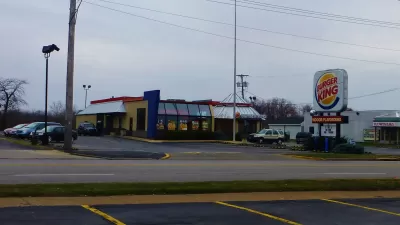A new study published in the February issue of Health Affairs presents evidence that providing fresh food in food deserts does not improve diets or health outcomes for residents.

Adding supermarkets to neighborhoods with a dearth of access to fresh and healthy food does not lead to improvements in residents' diets or health outcomes, according to an article by Clara Ritger, who details the findings of a report by a team of researchers from the London School of Hygiene and Tropical Medicine and Penn State University's departments of sociology, anthropology, and demography.
According to Ritger’s description, the study compares two neighborhoods in Philadelphia, one which received a new supermarket, and one which did not: “When a grocery store was opened in one Philadelphia food desert, 26.7 percent of residents made it their main grocery store and 51.4 percent indicated using it for any food shopping, the report found. But among the population that used the new supermarket, the researchers saw no significant improvement in BMI, fruit and vegetable intake, or perceptions of food accessibility, although there was a significant improvement in perception of accessibility to fruits and vegetables.”
Ritger’s reporting connects the study’s findings to the $500 million federal Healthy Food Financing Initiative: “if the conclusion is borne out, it would suggest that policymakers rethink the Healthy Food Financing Initiative if they want to promote healthier eating and healthier citizens.”
The new report isn’t the first in 2014 to question whether current programs are doing enough to solve the growing problem of obesity in this country. But then again, another recent report ties fast food to growing Body Mass Index in wealthy countries.
FULL STORY: Bad News for Obama’s Antiobesity Effort

Study: Maui’s Plan to Convert Vacation Rentals to Long-Term Housing Could Cause Nearly $1 Billion Economic Loss
The plan would reduce visitor accommodation by 25,% resulting in 1,900 jobs lost.

Alabama: Trump Terminates Settlements for Black Communities Harmed By Raw Sewage
Trump deemed the landmark civil rights agreement “illegal DEI and environmental justice policy.”

North Texas Transit Leaders Tout Benefits of TOD for Growing Region
At a summit focused on transit-oriented development, policymakers discussed how North Texas’ expanded light rail system can serve as a tool for economic growth.

Paris Bike Boom Leads to Steep Drop in Air Pollution
The French city’s air quality has improved dramatically in the past 20 years, coinciding with a growth in cycling.

Why Housing Costs More to Build in California Than in Texas
Hard costs like labor and materials combined with ‘soft’ costs such as permitting make building in the San Francisco Bay Area almost three times as costly as in Texas cities.

San Diego County Sees a Rise in Urban Coyotes
San Diego County experiences a rise in urban coyotes, as sightings become prevalent throughout its urban neighbourhoods and surrounding areas.
Urban Design for Planners 1: Software Tools
This six-course series explores essential urban design concepts using open source software and equips planners with the tools they need to participate fully in the urban design process.
Planning for Universal Design
Learn the tools for implementing Universal Design in planning regulations.
Smith Gee Studio
Alamo Area Metropolitan Planning Organization
City of Santa Clarita
Institute for Housing and Urban Development Studies (IHS)
City of Grandview
Harvard GSD Executive Education
Toledo-Lucas County Plan Commissions
Salt Lake City
NYU Wagner Graduate School of Public Service




























